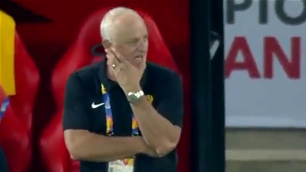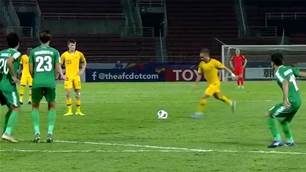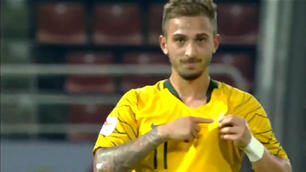n December 2006, FourFourTwo joined the Iraq national team for what many feared would be their final year of competition. With bombs exploding every day, in a country ripped apart by civil war, we shadowed the team through training camps in northern Iraq to the West Asian Championships in Jordan and finally to Asian Cup glory... This is their story.
Page 1 of 2 | Single page
What started as unbridled celebration ended in mass murder. No sooner had keeper Noor Sabri saved the deciding penalty against South Korea in the semi-finals of the Asian Cup than thousands of fans poured out into the stifling Iraqi summer to dance and sing. For a brief, all too fleeting moment, the crowd was united, firing celebratory bullets high into the late afternoon sky, the tracer fire from Kurd, Shia and Sunni indistinguishable from each other.
But then football has a strange way of defying convention in Iraq. With the country gripped by warfare pitting Muslim versus Muslim, secular versus religious, football is the only thing anyone can agree on. As the government slowly collapses and the army undermines itself with internal sectarian militias, the last symbol of nationalism, the last rallying point around which people feel proud to fly the Iraqi flag, is football. Which attracts the insurgents. As the revellers rejoiced, a suicide bomber quietly approached an ice cream stand in the well-heeled Mansour district of Baghdad, destroying himself and 30 football fans with him.
That night 20 more fans were killed across town in suicide attacks, as were five more, accidentally, when gravity reasserted its will and the bullets of victory fell back to earth. It’s tragic, but for Iraq, and Iraqi football in particular, it was just another bloody footnote. From the barbarous rule of Saddam Hussein and his son Uday, who was in charge of the Iraqi Olympic Committee, through to the invasion and counter insurgency, the Iraq team has had to overcome obstacles that would have destroyed any other: torture, murder, kidnap, extortion and now, finally, homelessness.
Yet the team has always excelled. Rarely in recent times have the Iraqis been outside FIFA’s top 40. They briefly graced the world stage at Mexico 86, reached the semi-finals of the Olympics in 2004 and the final of the Asian Games in 2006. But their crowning achievement would be winning the Asian Cup. The question is, when this golden generation of Iraq’s “Lions of Mesopotamia” leave the stage, will there be anyone to replace them?
It’s mid-June on the outskirts of Amman, Jordan and the hottest summer for 90 years in the tiny Hashemite kingdom. One half of the King Abdullah Stadium is cloaked in shadow, while the other is bathed in unforgiving mid-afternoon sunshine. The Iraqi team stands in the shade waiting for training and the first of Brazilian coach Jorvan Vieira’s steps towards the Asian Cup final.
The team is here for the West Asian Championship (WAC), a tournament that reads like a who’s who of Middle East conflict: Iraq, Iran, Syria, Lebanon, Palestine and Jordan. Technically Jordan are the hosts, but this might as well be a home tournament for the Iraqis given that the team plays all its home matches here and there are up to a million Iraqi refugees living in Jordan.
Jorvan – slight, with round glasses, greying stubble and a twinkling smile – taps his foot as he waits for the Jordanians to vacate the pitch so he can put his Iraqi team through its paces. He’s only been in charge for a few weeks and, with Asia’s biggest football tournament just 14 days away, every training session is vital. There’s also the tricky prospect of a match against Palestine the next day, which they must win to reach the semi-finals of the WAC.
The Jordanians are running late, though, after insisting that, as always, they pray towards Mecca before training. Given the sectarian strife just over Jordan’s eastern border, the Iraqis refuse to follow suit. “I think I have the most difficult job in the world,” Jorvan offers absent-mindedly as he watches his rivals dodge cones. “I have to deal with these boys with many, many problems: social, political, internal. Most of these people don’t know where they are. Every minute the situation changes.”
Jorvan, a Muslim convert, is a veteran of Middle Eastern football, having coached most of his career in Saudi Arabia, Oman, Egypt and Morocco. He was fourth choice for the job, and he’s been given only a two-month contract, but it was preferable to having an Iraqi coach. The last one, Akram Ahmed Salman, quit after receiving two death threats – one from a Sunni group, the other from a Shia organisation. He was later reinstated and, proving that there’s no sentimentality in football, sacked for a poor showing in January’s Gulf Cup.
Still, being Brazilian – and never having set foot in Iraq – hasn’t inoculated Jorvan from the realities of coaching the team. “We lost our physio, two days before we got here,” he explains as his charges trot onto the field. “A bomb exploded in Baghdad and he was passing by. He was on his way to the travel agent to buy his ticket to come here.”
Talk to the players and it becomes clear that these macabre tales of cruelty and bad luck are common. Everyone has lost family and friends to the war. Keeper Sabri saw his brother-in-law killed a few weeks ago. Midfielder Haitham Kadim watched gunmen storm the pitch during a match in Baghdad and shoot his friend in the heart. Hawar Mullah Mohammad, a Kurd who plays up front, had to leave his home in Baghdad and sign for Al Ain, an oasis club in the middle of a desert in the UAE, to ensure his own safety. “I’d lost two members of my family,” he explains. “It’s difficult when you have no safety. Cars explode all the time. I had to pick up my two guns before going to practice, because I’d been threatened. You can buy guns anywhere in Baghdad. You need them. I don’t go back any more.”
The threat is twofold. On the one hand, players are targets for representing a unity that insurgents want to undermine. On the other, footballers are high-profile fodder for criminal gangs. A kidnapped national team player can be traded to his family for a high price, anywhere up to $6 million according to one player. Given the dangers, it’s no surprise that Iraq’s footballers are fleeing their homeland.
But then football has a strange way of defying convention in Iraq. With the country gripped by warfare pitting Muslim versus Muslim, secular versus religious, football is the only thing anyone can agree on. As the government slowly collapses and the army undermines itself with internal sectarian militias, the last symbol of nationalism, the last rallying point around which people feel proud to fly the Iraqi flag, is football. Which attracts the insurgents. As the revellers rejoiced, a suicide bomber quietly approached an ice cream stand in the well-heeled Mansour district of Baghdad, destroying himself and 30 football fans with him.
That night 20 more fans were killed across town in suicide attacks, as were five more, accidentally, when gravity reasserted its will and the bullets of victory fell back to earth. It’s tragic, but for Iraq, and Iraqi football in particular, it was just another bloody footnote. From the barbarous rule of Saddam Hussein and his son Uday, who was in charge of the Iraqi Olympic Committee, through to the invasion and counter insurgency, the Iraq team has had to overcome obstacles that would have destroyed any other: torture, murder, kidnap, extortion and now, finally, homelessness.
Yet the team has always excelled. Rarely in recent times have the Iraqis been outside FIFA’s top 40. They briefly graced the world stage at Mexico 86, reached the semi-finals of the Olympics in 2004 and the final of the Asian Games in 2006. But their crowning achievement would be winning the Asian Cup. The question is, when this golden generation of Iraq’s “Lions of Mesopotamia” leave the stage, will there be anyone to replace them?
It’s mid-June on the outskirts of Amman, Jordan and the hottest summer for 90 years in the tiny Hashemite kingdom. One half of the King Abdullah Stadium is cloaked in shadow, while the other is bathed in unforgiving mid-afternoon sunshine. The Iraqi team stands in the shade waiting for training and the first of Brazilian coach Jorvan Vieira’s steps towards the Asian Cup final.
The team is here for the West Asian Championship (WAC), a tournament that reads like a who’s who of Middle East conflict: Iraq, Iran, Syria, Lebanon, Palestine and Jordan. Technically Jordan are the hosts, but this might as well be a home tournament for the Iraqis given that the team plays all its home matches here and there are up to a million Iraqi refugees living in Jordan.
Jorvan – slight, with round glasses, greying stubble and a twinkling smile – taps his foot as he waits for the Jordanians to vacate the pitch so he can put his Iraqi team through its paces. He’s only been in charge for a few weeks and, with Asia’s biggest football tournament just 14 days away, every training session is vital. There’s also the tricky prospect of a match against Palestine the next day, which they must win to reach the semi-finals of the WAC.
The Jordanians are running late, though, after insisting that, as always, they pray towards Mecca before training. Given the sectarian strife just over Jordan’s eastern border, the Iraqis refuse to follow suit. “I think I have the most difficult job in the world,” Jorvan offers absent-mindedly as he watches his rivals dodge cones. “I have to deal with these boys with many, many problems: social, political, internal. Most of these people don’t know where they are. Every minute the situation changes.”
Jorvan, a Muslim convert, is a veteran of Middle Eastern football, having coached most of his career in Saudi Arabia, Oman, Egypt and Morocco. He was fourth choice for the job, and he’s been given only a two-month contract, but it was preferable to having an Iraqi coach. The last one, Akram Ahmed Salman, quit after receiving two death threats – one from a Sunni group, the other from a Shia organisation. He was later reinstated and, proving that there’s no sentimentality in football, sacked for a poor showing in January’s Gulf Cup.
Still, being Brazilian – and never having set foot in Iraq – hasn’t inoculated Jorvan from the realities of coaching the team. “We lost our physio, two days before we got here,” he explains as his charges trot onto the field. “A bomb exploded in Baghdad and he was passing by. He was on his way to the travel agent to buy his ticket to come here.”
Talk to the players and it becomes clear that these macabre tales of cruelty and bad luck are common. Everyone has lost family and friends to the war. Keeper Sabri saw his brother-in-law killed a few weeks ago. Midfielder Haitham Kadim watched gunmen storm the pitch during a match in Baghdad and shoot his friend in the heart. Hawar Mullah Mohammad, a Kurd who plays up front, had to leave his home in Baghdad and sign for Al Ain, an oasis club in the middle of a desert in the UAE, to ensure his own safety. “I’d lost two members of my family,” he explains. “It’s difficult when you have no safety. Cars explode all the time. I had to pick up my two guns before going to practice, because I’d been threatened. You can buy guns anywhere in Baghdad. You need them. I don’t go back any more.”
The threat is twofold. On the one hand, players are targets for representing a unity that insurgents want to undermine. On the other, footballers are high-profile fodder for criminal gangs. A kidnapped national team player can be traded to his family for a high price, anywhere up to $6 million according to one player. Given the dangers, it’s no surprise that Iraq’s footballers are fleeing their homeland.
Related Articles

Champs and Chumps: Who impressed for the Olyroos?

Watch! Reno Piscopo lands stunner in Olyroos draw













